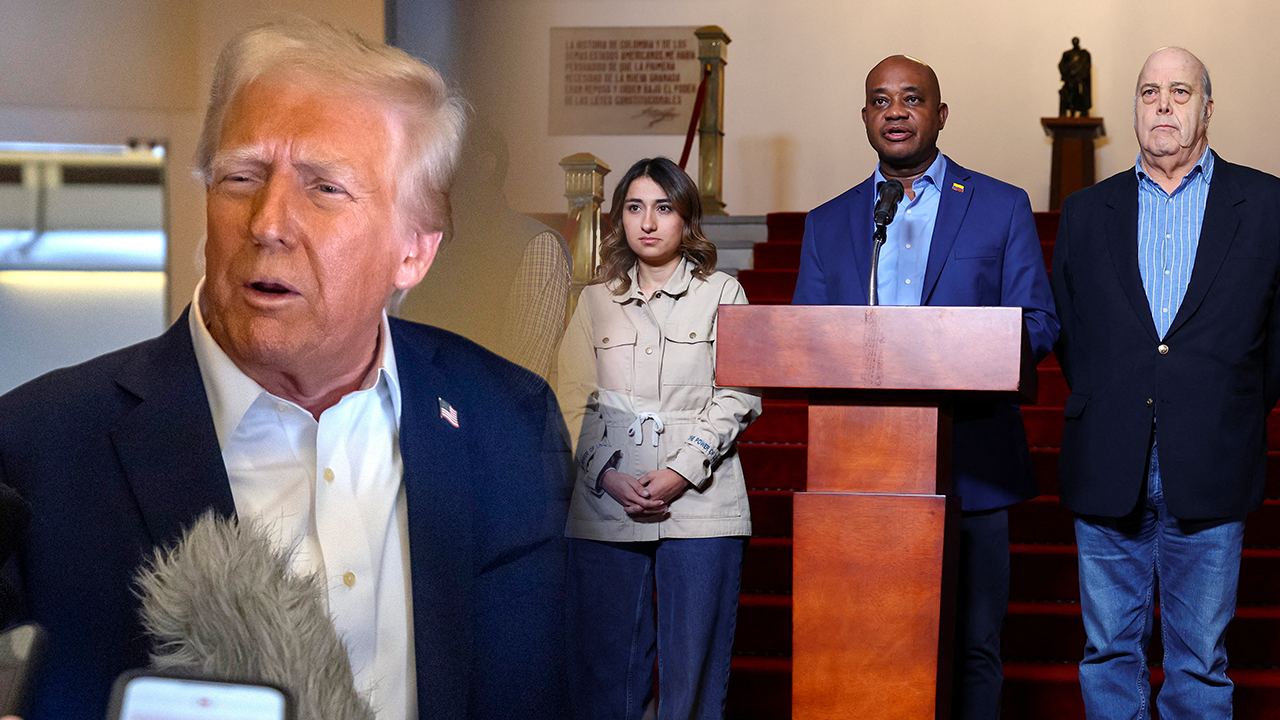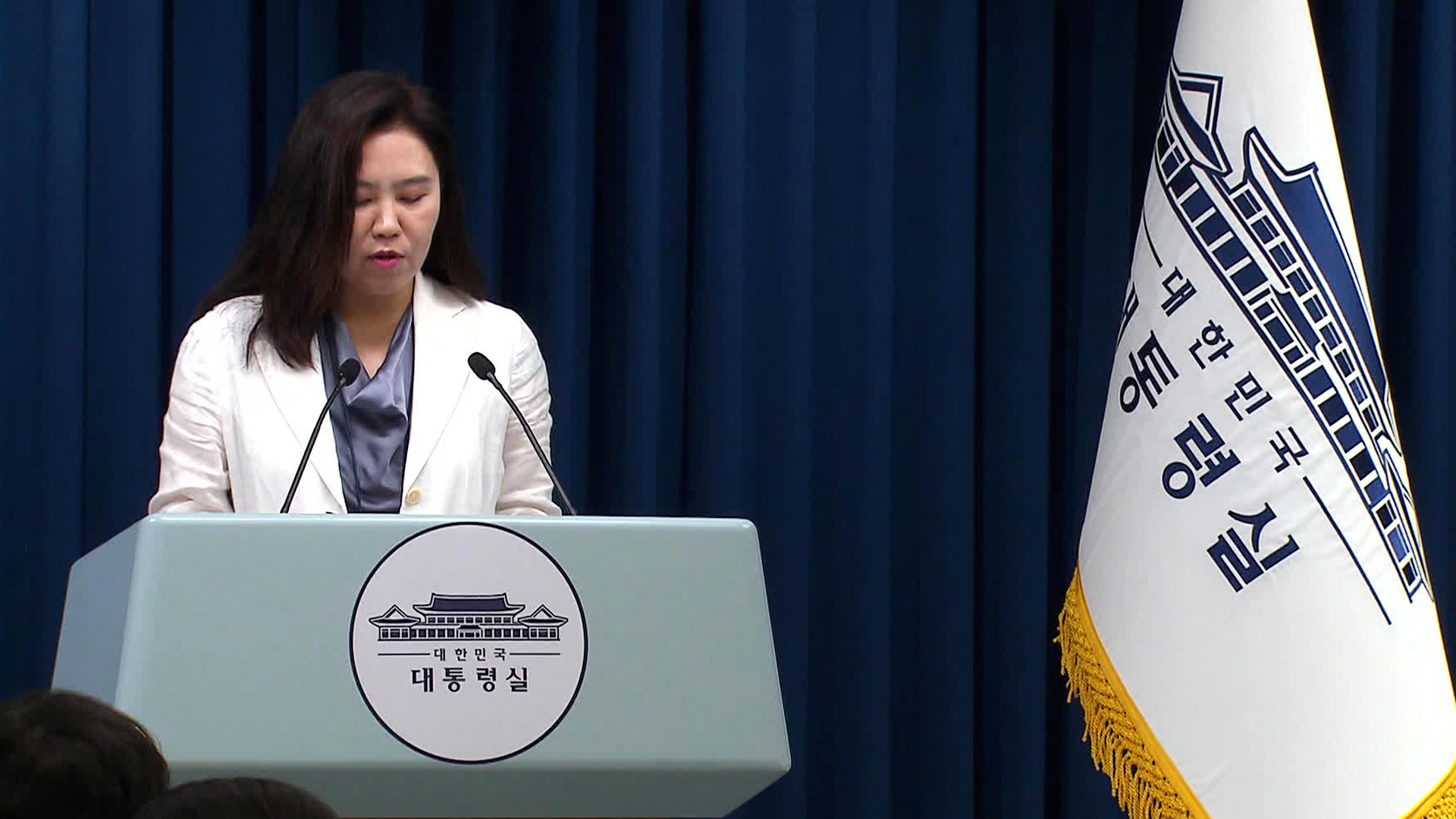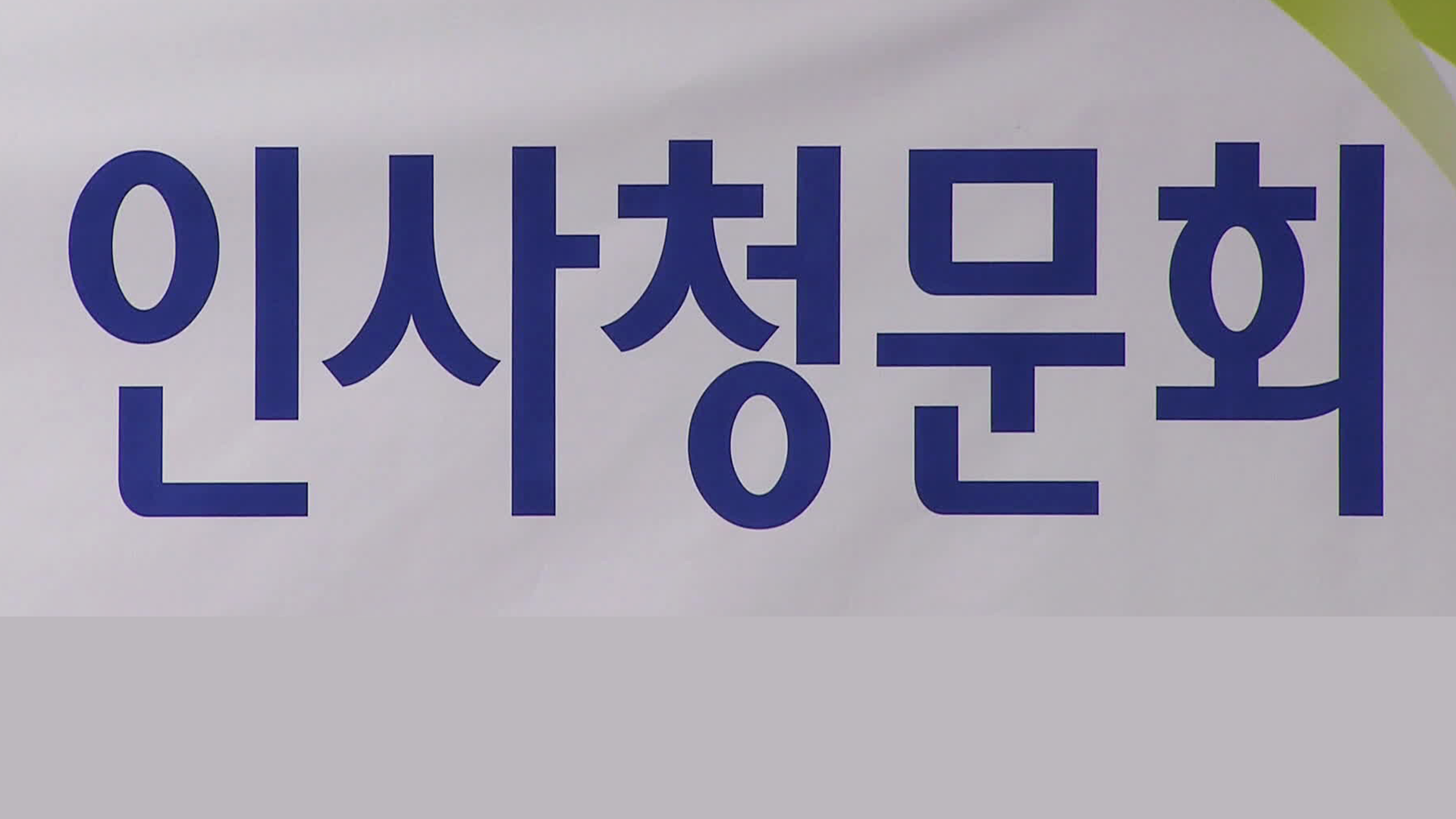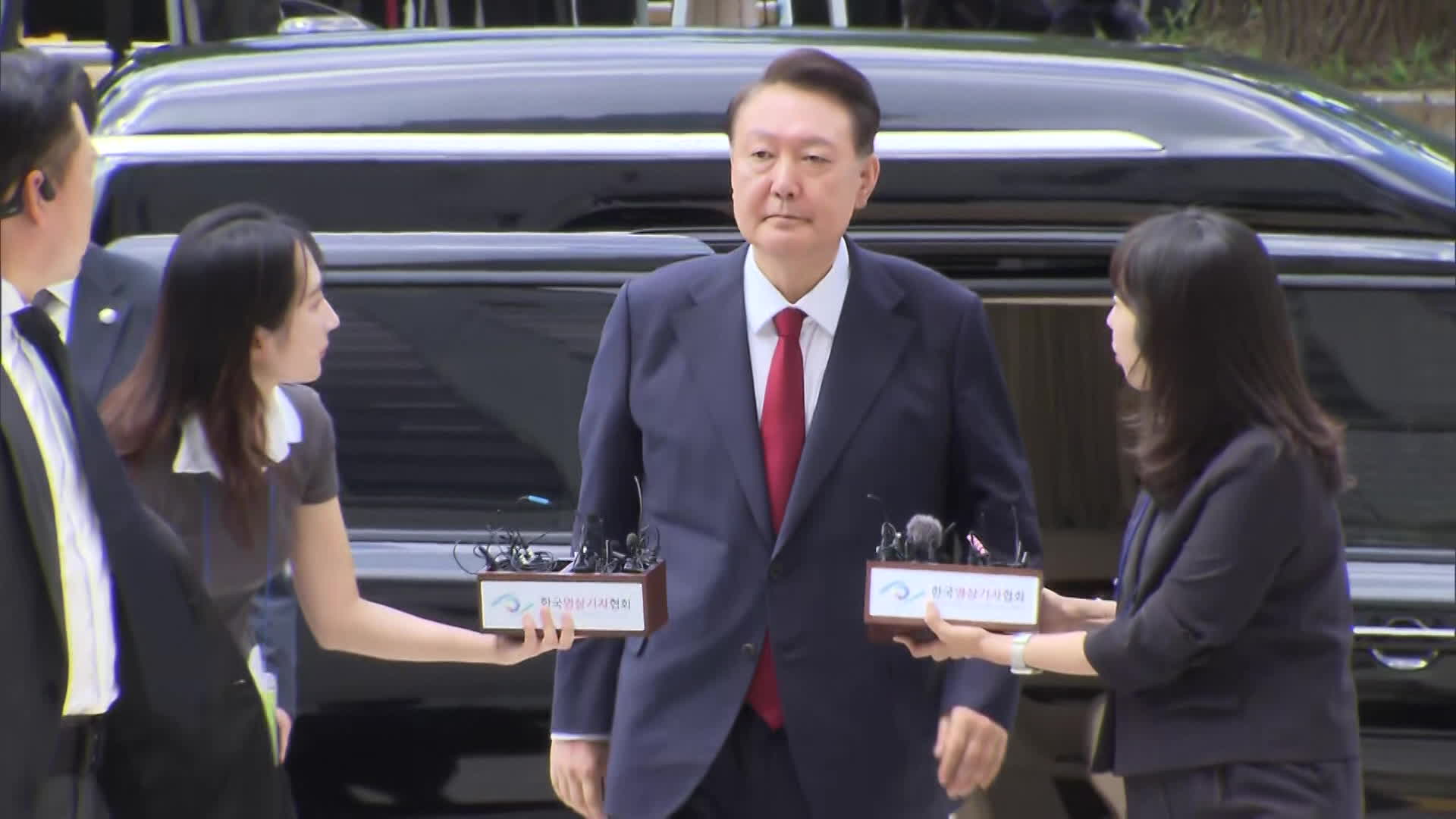[Anchor]
The prospect that U.S. President Donald Trump would use tariffs as a diplomatic pressure tool has become a reality.
Colombia, which had refused to accept repatriated illegal immigrants, has immediately capitulated to the tariff imposition.
The threat of U.S. tariffs seems likely to continue in the future.
Park Il-jung from New York reports.
[Report]
A group of people in handcuffs is walking through the airport.
They are Brazilians who have been deported from the United States.
[Lucas Gabriel Maya/Deported Brazilian: "There was no respect, it was unreasonable, it was racist, and it was aggressive."]
As dissatisfaction with the U.S. deportation methods for illegal immigrants grows, the Colombian government has denied the landing of two U.S. military planes carrying 160 immigrants.
They claim that their citizens were treated as criminals.
Colombian President Gustavo Petro demanded through social media that dignity and respect must be shown when repatriating their citizens.
In response, U.S. President Trump pulled out the retaliation card.
He announced the imposition of a 25% emergency tariff on Colombia, along with a travel ban and visa cancellations.
This is the first retaliatory measure taken by the Trump administration regarding immigration issues.
Colombia also retaliated with counter-tariffs but ultimately surrendered.
They could not afford to give up their largest market, the United States.
[Luis Gilberto Murillo/Colombian Foreign Minister: "We will continue to accept Colombians who are deported back."]
The White House also revealed the agreement between the two countries and lifted the sanctions policy within nine hours.
While an immediate trade war has been avoided, the future remains a concern.
[Guadalupe Correa-Cabrera/George Mason University Professor: "This is also a sign to other countries, particularly a sign to Mexico, because there are more things that the United States is going to negotiate with Mexico."]
The U.S. has confirmed the potential success of its retaliation threats through this incident.
Accordingly, the threat of imposing tariffs on Canada and Mexico is expected to increase next month.
This is Park Il-jung from KBS News in New York.
The prospect that U.S. President Donald Trump would use tariffs as a diplomatic pressure tool has become a reality.
Colombia, which had refused to accept repatriated illegal immigrants, has immediately capitulated to the tariff imposition.
The threat of U.S. tariffs seems likely to continue in the future.
Park Il-jung from New York reports.
[Report]
A group of people in handcuffs is walking through the airport.
They are Brazilians who have been deported from the United States.
[Lucas Gabriel Maya/Deported Brazilian: "There was no respect, it was unreasonable, it was racist, and it was aggressive."]
As dissatisfaction with the U.S. deportation methods for illegal immigrants grows, the Colombian government has denied the landing of two U.S. military planes carrying 160 immigrants.
They claim that their citizens were treated as criminals.
Colombian President Gustavo Petro demanded through social media that dignity and respect must be shown when repatriating their citizens.
In response, U.S. President Trump pulled out the retaliation card.
He announced the imposition of a 25% emergency tariff on Colombia, along with a travel ban and visa cancellations.
This is the first retaliatory measure taken by the Trump administration regarding immigration issues.
Colombia also retaliated with counter-tariffs but ultimately surrendered.
They could not afford to give up their largest market, the United States.
[Luis Gilberto Murillo/Colombian Foreign Minister: "We will continue to accept Colombians who are deported back."]
The White House also revealed the agreement between the two countries and lifted the sanctions policy within nine hours.
While an immediate trade war has been avoided, the future remains a concern.
[Guadalupe Correa-Cabrera/George Mason University Professor: "This is also a sign to other countries, particularly a sign to Mexico, because there are more things that the United States is going to negotiate with Mexico."]
The U.S. has confirmed the potential success of its retaliation threats through this incident.
Accordingly, the threat of imposing tariffs on Canada and Mexico is expected to increase next month.
This is Park Il-jung from KBS News in New York.
■ 제보하기
▷ 카카오톡 : 'KBS제보' 검색, 채널 추가
▷ 전화 : 02-781-1234, 4444
▷ 이메일 : kbs1234@kbs.co.kr
▷ 유튜브, 네이버, 카카오에서도 KBS뉴스를 구독해주세요!
- Colombia yields to tariff threat
-
- 입력 2025-01-27 23:37:33

[Anchor]
The prospect that U.S. President Donald Trump would use tariffs as a diplomatic pressure tool has become a reality.
Colombia, which had refused to accept repatriated illegal immigrants, has immediately capitulated to the tariff imposition.
The threat of U.S. tariffs seems likely to continue in the future.
Park Il-jung from New York reports.
[Report]
A group of people in handcuffs is walking through the airport.
They are Brazilians who have been deported from the United States.
[Lucas Gabriel Maya/Deported Brazilian: "There was no respect, it was unreasonable, it was racist, and it was aggressive."]
As dissatisfaction with the U.S. deportation methods for illegal immigrants grows, the Colombian government has denied the landing of two U.S. military planes carrying 160 immigrants.
They claim that their citizens were treated as criminals.
Colombian President Gustavo Petro demanded through social media that dignity and respect must be shown when repatriating their citizens.
In response, U.S. President Trump pulled out the retaliation card.
He announced the imposition of a 25% emergency tariff on Colombia, along with a travel ban and visa cancellations.
This is the first retaliatory measure taken by the Trump administration regarding immigration issues.
Colombia also retaliated with counter-tariffs but ultimately surrendered.
They could not afford to give up their largest market, the United States.
[Luis Gilberto Murillo/Colombian Foreign Minister: "We will continue to accept Colombians who are deported back."]
The White House also revealed the agreement between the two countries and lifted the sanctions policy within nine hours.
While an immediate trade war has been avoided, the future remains a concern.
[Guadalupe Correa-Cabrera/George Mason University Professor: "This is also a sign to other countries, particularly a sign to Mexico, because there are more things that the United States is going to negotiate with Mexico."]
The U.S. has confirmed the potential success of its retaliation threats through this incident.
Accordingly, the threat of imposing tariffs on Canada and Mexico is expected to increase next month.
This is Park Il-jung from KBS News in New York.
The prospect that U.S. President Donald Trump would use tariffs as a diplomatic pressure tool has become a reality.
Colombia, which had refused to accept repatriated illegal immigrants, has immediately capitulated to the tariff imposition.
The threat of U.S. tariffs seems likely to continue in the future.
Park Il-jung from New York reports.
[Report]
A group of people in handcuffs is walking through the airport.
They are Brazilians who have been deported from the United States.
[Lucas Gabriel Maya/Deported Brazilian: "There was no respect, it was unreasonable, it was racist, and it was aggressive."]
As dissatisfaction with the U.S. deportation methods for illegal immigrants grows, the Colombian government has denied the landing of two U.S. military planes carrying 160 immigrants.
They claim that their citizens were treated as criminals.
Colombian President Gustavo Petro demanded through social media that dignity and respect must be shown when repatriating their citizens.
In response, U.S. President Trump pulled out the retaliation card.
He announced the imposition of a 25% emergency tariff on Colombia, along with a travel ban and visa cancellations.
This is the first retaliatory measure taken by the Trump administration regarding immigration issues.
Colombia also retaliated with counter-tariffs but ultimately surrendered.
They could not afford to give up their largest market, the United States.
[Luis Gilberto Murillo/Colombian Foreign Minister: "We will continue to accept Colombians who are deported back."]
The White House also revealed the agreement between the two countries and lifted the sanctions policy within nine hours.
While an immediate trade war has been avoided, the future remains a concern.
[Guadalupe Correa-Cabrera/George Mason University Professor: "This is also a sign to other countries, particularly a sign to Mexico, because there are more things that the United States is going to negotiate with Mexico."]
The U.S. has confirmed the potential success of its retaliation threats through this incident.
Accordingly, the threat of imposing tariffs on Canada and Mexico is expected to increase next month.
This is Park Il-jung from KBS News in New York.
-
-

박일중 기자 baikal@kbs.co.kr
박일중 기자의 기사 모음
-
이 기사가 좋으셨다면
-
좋아요
0
-
응원해요
0
-
후속 원해요
0















이 기사에 대한 의견을 남겨주세요.